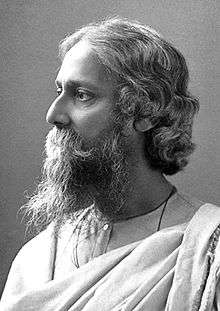Kabuliwala (1961 film)
| Kabuliwala (1961) | |
|---|---|
 Film poster | |
| Directed by | Hemen Gupta |
| Produced by |
Bimal Roy Leela Desai (assoc.) |
| Written by |
Vishram Bedekar S. Khalil |
| Based on |
Kabuliwala by Rabindranath Tagore |
| Starring |
Balraj Sahni Usha Kiran Sajjan Sonu. |
| Music by | Salil Choudhury |
| Cinematography | Kamal Bose |
| Edited by | Madhu Prabhavalkar |
Release dates | December 14, 1961 |
Running time | 134 minutes |
| Country | India |
| Language | Hindi |
Kabuliwala (Hindi: काबुलीवाला) is a 1961 Hindi film based on a story, Kabuliwala, by the Bengali writer Rabindranath Tagore. It was directed by Hemen Gupta and starred Balraj Sahni, Usha Kiran, Sajjan, Sonu and Baby Farida.[1][2]
Plot
The simple story of Kabuliwala is about the affection between Abdur Rahamat Khan, an Afghani immigrant dry-fruit-seller in Calcutta and Mini (Sonu), a girl who he imagines as his child-figure in memory of his daughter, Amina (Baby Farida), left behind in Kabul.
Cast
- Balraj Sahni as Abdul Rehman Khan
- Sonu as Mini
- Usha Kiran as Rama, Mini's mother
- Padma
- Laxmi
- Sarita Devi
- Anwari Bai
- Leela Agha
- Baby Farida
- Asit Sen as Bhola
Background
Gupta had remained private secretary to Subhas Chandra Bose, and went on to direct many films including Taksaal (1956), also starring Balraj Sahni, and his tribute Netaji Subhas Chandra Bose (1966). The most successful adaptation of a Tagore story outside Bengal was Hemen Gupta’s Kabuliwala, produced by Bimal Roy, starring the veteran actor Balraj Sahni.
This story, unlike many other Tagore-inspired films that are more strongly rooted in context and period, offers a more classical perspective on humanism, identity and difference. Tagore’s Kabuliwala was published as a short story in Sadhana, a Bangla literary magazine he edited through the 1890s and the early decades of the twentieth century.
The story was translated from Bangla into English by the Irish woman Margaret Elizabeth Noble, more popularly known to the world as Sister Nivedita, and published in the Modern Review.[3]
Soundtrack
Music – Salil Choudhury; Lyrics – Prem Dhawan, Gulzar
- Aye mere pyaare watan – Manna Dey (Lyrics: Prem Dhawan)
- Ganga aaye kahan se – Hemant Kumar
- Kabuliwala – Hemant Kumar, Usha Mangeshkar
- O ya qurbaan – Mohammed Rafi
References
- ↑ "Of Kabuliwala and Unconditional Love", by Dinesh Raheja, Rediff.com.
- ↑ Kabuliwala New York Times.
- ↑ "From Kolkata to Dublin via Kabul: Tagore's Internationalism And Cinema". Silhouette Magazine & Learning and Creativity. 2014-05-25. Retrieved 2014-05-27.
